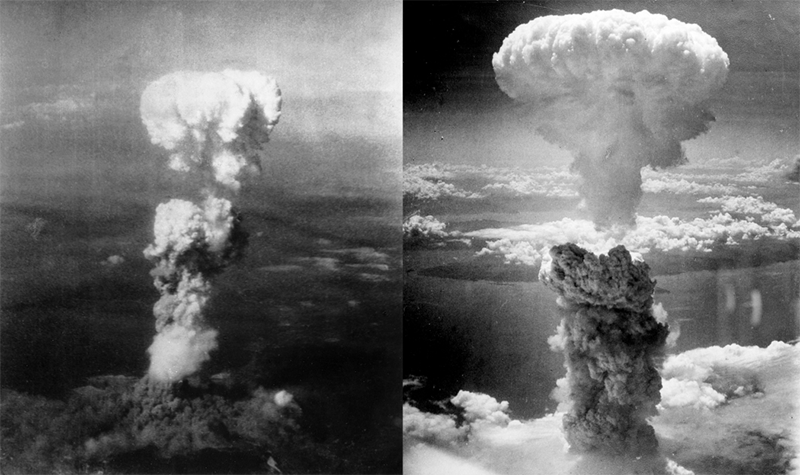In August 1945, the United States dropped two atomic bombs on Japan, one on Hiroshima and one on Nagasaki.
The bombings on these cities several days apart killed more than 210,000 and led to a lifetime of serious health issues for thousands of others.
The devastating attack led to the end of World War II, when shortly afterward, Japanese Emperor Hirohito announced that Japan would surrender.
As the 80th anniversary of the bombings approaches, there are a number of ways that Union will connect with this consequential moment in world history.
These include movie screenings, guest speakers and course material across interdisciplinary offerings.
“We are bringing science and humanities together in a powerful way to highlight a critical moment in our history,” said Jennifer Matsue, professor and chair of music, Asian studies and anthropology. She is helping coordinate all events.
“We need to keep reminding people to be fully aware of the dangers of atomic weaponry at a time when we are experiencing heightened global conflict.”
The first event is a free private screening for the campus community at 6:30 p.m. Monday, Feb. 3, of the documentary, “Okurimono” at Bowtie Movieland. The Canadian director, Laurence Lévesque, will host a Q & A after the screening.
The film tells the story of Noriko Oi, who decides to reconstruct the past of her mother, Mitsuko, a survivor of the atomic bomb, in the hope of passing down her cultural heritage to her children and healing the dark reminiscences of a tragic past.
“The film ‘Oppenheimer’ failed to transport audiences to the sites of devastation,” said organizer Jim de Sève, senior artist-in-residence, film studies, and co-director of the Film Studies program, sponsor of the event. “Okurimono does. And it does it with heart, civility and thoughtfulness.”
Co-sponsors are Asian studies, the Templeton Institute and the departments of History and Music.
Other films to be shown during winter term include “Gojira” in Matsue’s class, From Bombs to Buddhism: Fatalism, Technology and Modern Japanese Culture, and “Black Rain,” in Remembering World War II in Asia, a class taught by Joyce Madancy, professor of history.
A 1954 classic by the director Ishiro Honda, “Gojira” is the original appearance by Godzilla and considered a metaphor for the end of World War II and the detonation of nuclear weapons onto Hiroshima and Nagasaki.
“Black Rain” is a 1989 masterpiece from Shohei Imamura that centers on the aftermath of the atomic bombing of Hiroshima and its effect on a surviving family.
Also, 1983’s “Barefoot Gen,” an animated film from director Mori Masaki, will be discussed in Madancy’s class and Japanese Manga and Anime, taught by Junko Ueno, professor of Japanese. The film “revolves around the life of 6-year-old Gen Nakaoka, who must grow up quickly due to the harsh reality of living through wartime food shortages and constant air raids in Hiroshima.”
Zakuro-Daiko, the Japanese Drumming and Global Fusion Band, will premiere a new musical work commemorating the 80th anniversary of the bombings at its winter concert Friday, Feb. 28, at 7 p.m. and Saturday, March 1, at 1 p.m. in Emerson Auditorium in the Taylor Music Center
The ensemble (whose name translates to Garnet Drums) was established in 2007 by Matsue to bring Japanese music and culture to life on campus. The group performs a type of Japanese ensemble drumming that is popular in Japan and throughout the world.
In the spring, Joshua Pilzer, award-winning author of “Quietude: A Musical Anthropology of ‘Korea’s Hiroshima,’” will speak to students in Music and Trauma in World War II, a new class taught by Jin Byun, director of music performance. Details are being finalized.
Union’s expansive focus on the anniversary of the bombings follows the awarding of last fall’s Nobel Peace Prize to Nihon Hidankyo, a Japanese group of atomic bomb survivors that was recognized for its efforts to rid the world of nuclear weapons.
Matsue acknowledged today’s students may not be aware of the first — and so far, only — wartime atomic bombings. But she believes it’s imperative to raise awareness of the dangers of nuclear war, in hopes of never repeating the atrocities of the past.
“As educators, it’s important for us to get our students to think about that what’s happened in the past is relevant to what’s happening today,” she said. “That story can be told so much better through humanity.”
